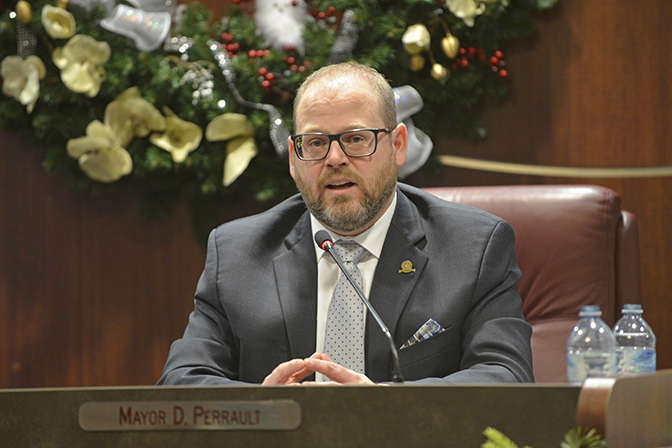
Swift Current City Council approved their second consecutive double digit percent tax increase when they released their 2018 budget on Monday night.
Council unanimously approved the 2018 budget which calls for a 13.14 per cent tax hike which will cost the average residential property owner approximately an additional $16.25 per month. The increase for 2018 comes on the heels of 14.1 per cent increase in the 2017 city budget which raised taxed approximately an additional $10.83 per month.
Swift Current Mayor Denis Perrault said the tax increase was necessary in part to help cover $915,000 in reduced provincial revenue received from grants in lieu, less revenue sharing, plus reduced revenue for policing. This alone required a 5.72 per cent tax increase to cover this lower funding.
Swift Current is also in the fifth and final year of a financial strategy which calls for a 6.0 per cent tax increases, as the city moves away from a reliance on Light and Power dividends and away from debt financing for capital projects.
“What we’re looking at for 2018 is an increase of 13.14 per cent. And although that does seem high, six per cent of that is to do with our financial strategy. And this is our last year of five years where every year we had six per cent included in there, so that way weren’t relying on our Light and Power dividend anymore – we’d be able to use that money for capital. Almost six per cent, in addition to that, was due directly to our changes to our provincial funding. So you can see that the majority of this change this year are to do with those two items.”
The remaining increases are 1.27 per cent for operations and a small 0.15 per cent for capital projects.
“Percentages, that’s why I always have a hard time with it. If you start with a dollar and do a 10 per cent increase, or if you start with 20 dollars and do a 10 per cent increase, they are obviously so much different than that,” Perrault said.
“As of today, I can assure all of our public, and all of our residents, that we do have the lowest residential taxes in the province across Cities. And for businesses we’re very, very competition.”
The overall budget is anticipating $61.87 million in revenue during 2018, an increase from the 2017 forecast amount of $58.19 million. The tax levy and grants portion of the budget is forecast to raise $22.18 million of this revenue total, up from the $20 million forecast in 2017.
Perrault realizes that some city homeowners were impacted by the property revaluation which took effect last year, and they are now facing another tax increase this year.
“For each and every one of them, I’m always open and I’d definitely like to talk to them about it,” he said.
“I sincerely believe that we, in the City of Swift Current, offer the absolute best services for the price that you pay for your taxes. Taxes are, quite frankly, a fee for those services. And we try very hard to be able to deliver all of those things, from fire to police, we try to offer it from roads to sidewalks, from museums to art galleries, and parks and recreation, to an iPlex, to pools and all those things that make up our City budget.”
“We try very, very hard, always looking at it from the ratepayers perspective to try to give them, each and every one of them, the best value for those dollars spent.”
Perrault points out that as a business owner, he too will be facing both higher residential taxes and commercial taxes.
“And I’m ok with that. I’m ok knowing that I’m getting great services for the fees that I pay. And to anyone that does has a challenge with that, I’d be more than happy to speak with them.”
Swift Current has now delivered two budgets during the 2017 calendar year. The 2017 municipal budget was approved at the February 13 meeting, and Perrault said it makes sense to have a budget in place for the start of the calendar year.
“It’s like planning your month before you get your paycheque. It kind of makes sense to be able to do that,” he said.
“The best part about this is we’ve got a budget that’s now delivered, and so on the first of January, when our fiscal calendar starts, they’ll know exactly what’s in their budget for each department moving forward.”
“A budget’s a plan. It’s a tool that helps you plan how you’re going to spend and how you’re going to focus resources going forward. I see nothing but benefit for it.”





